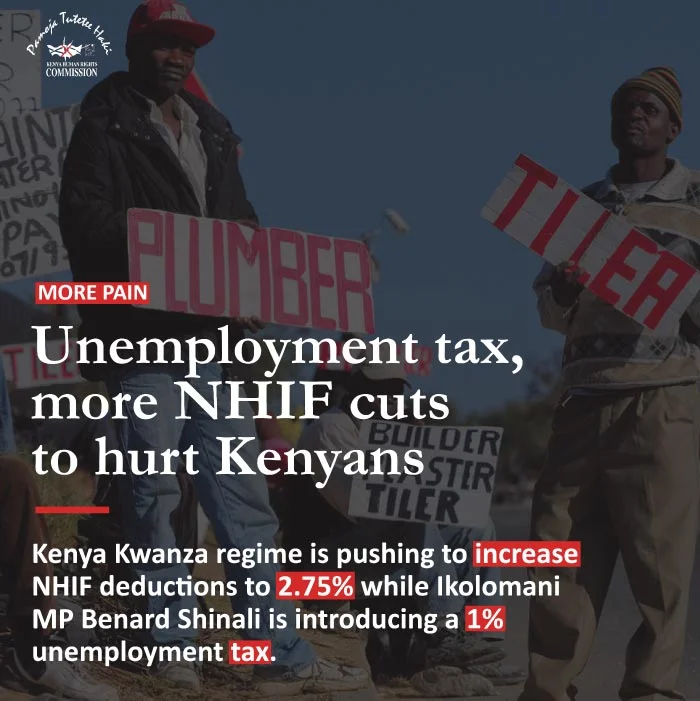As Kenyans continue to grapple with the burden of taxation, a sense of frustration and bewilderment prevails, and many are asking themselves: when will the cycle of ever-increasing taxation come to an end? The Kenya Kwanza government is considering more statutory deductions, taxes, and levies through the National Health Insurance Fund (NHIF) under the Social Health Insurance Bill, 2023. The proposal to have a mandatory 2.75 percent monthly contribution from employees' basic salaries for the health scheme is excessive and will further strain the taxpayer. Okoa Ochumi coalition survey, done between May 19 - June 6, showed 77 percent of Kenyans do not support the proposed NHIF deductions.
Furthermore, another proposal involves implementing an unemployment tax. Ikolomani MP Benard Shinali has introduced the Unemployment Insurance Bill, 2023, which suggests that employees contribute one percent of their income, with a corresponding one percent contribution from employers, directed towards the Unemployment Insurance Fund.
Don’t forget that the National Social Security Fund (NSSF) rose to Sh1,700 from Sh1,080 early this year.
And just in June, this regime introduced a 1.5 percent housing levy. Many of us recall how this administration initially presented this tax as a voluntary contribution scheme, where employees would contribute three percent to the housing fund, matched by an equal amount from their employers. The government assured Kenyans that after 15 years, we would own a home, and if we didn't wish to purchase a house, we could access our contributions after seven years. However, the government later reversed course without consultation, despite 92 percent of Kenyans rejecting the proposal, according to data from Okoa Ochumi. It transformed what was supposed to be a voluntary contribution into a mandatory tax begging whether Kenyans’ views matter in government decision-making processes.

Unprecedented taxes!
There is a pattern here: More taxation lurks in the shadows whenever President William Ruto initiates a financial action. Given the unmistakable track record of this administration's insatiable appetite for imposing overt and concealed levies, we are merely witnessing the tip of the iceberg, and without vigilance, a substantial portion, if not direct and covert taxes could siphon off the majority, of our earnings. For instance, we have increased rates on certain goods, exemptions for others, a zero rating for some supplies and a new deadline for remitting the tax. Notably, the government doubled the VAT on petroleum products from 8% to 16%. Also, the government is mulling over increasing VAT to 18% to align with other rates of countries within the East African Community (EAC) in the Draft Medium Term Debt Management Strategy for FY 2024/25 and 2026/27. Currently, super petrol retails at KES 211.64 per liter within Nairobi. A further increase in VAT to 18% will raise the price of the commodity to KES 215.87, considering the current EPRA-approved prices.
Stop double taxation!
Currently, Kenyans are facing the issue of double taxation due to recent changes in tax regulations. Starting from July 1, this government began imposing taxes on professional club entrance and subscription fees, which an employer pays on behalf of its employees. Fees are deducted when calculating taxable income. It has resulted in a situation where the employer and the employee are burdened with the tax, leading to double taxation.
Additionally, the Kenya Kwanza government has expanded the range of taxable supplies to include compensation for loss. Under the Finance Act, a standard VAT rate is applied to insurance compensation related to taxable supplies, even when the rightful owner had already deducted input tax while purchasing the lost supplies. Taxing insurance compensation, which replaces lost value after a damaging event, amounts to another instance of double taxation.
Another concern for Kenyan taxpayers is the risk of being taxed by county and national governments for the same income. For instance, Nairobi County has proposed a tax of Sh10,000 per month for vehicles up to seven tons carrying construction materials in and out of the capital. Similarly, starting from January 1, 2024, vans, pick-ups, trucks, prime movers, trailers, and lorries will be required to pay an advance tax of Sh2,500 per ton of loading capacity or Sh5,000 per year, whichever is higher, as specified by the Finance Act.
Blatant abuse of sovereignty of the people
Under Article 1 of the constitution, sovereignty belongs to the people, and as such, all these taxes cannot be implemented without meaningful public input. However, we are all too aware of the interference of public participation in Kenya. It often seems like a mere checkbox process influenced by politics, making it an unreliable safeguard against punitive laws. For instance, despite 970 out of 1,080 petitions (90%) opposing additional taxation through the Finance Bill of 2023, lawmakers aligned with the regime rammed it through. The president used strong-arm tactics; warning MPs allied to the Kenya Kwanza political wing not to oppose the bill. Recently, the Senate and National Assembly allocated a few days for public participation in health-related bills, which was insufficient for the public to give meaningful input. Unfortunately, scenarios of this nature have become a trend, thus subverting the will of the people.
We need a national tax policy
The regime’s ability to impose excessive taxation has been facilitated by Kenya's absence of a comprehensive national tax policy, which would provide a systematic framework for developing and implementing tax-related laws, regulations, and guidelines. Currently, our tax system lacks predictability, which poses difficulties for both individuals and businesses, as it heavily relies on financial legislation introduced annually. To effectively tax sectors that are traditionally challenging to regulate, such as agriculture, the informal economy, and online businesses, there must be a well-defined framework to steer the taxation process.
More proposals
Instead of burdening Kenyans with punitive taxes, the government SHOULD broaden the tax base by focusing on previously untapped revenue sources that have a less detrimental impact on economic growth. One unexplored source in Kenya is the property taxes, which can be feasibly enforced. For instance, by updating the property valuation roll in Nairobi City County, it is anticipated that property tax collections will more than double the current rate of 36 percent.
The government MUST also address tax evasion by high-net-worth people, which reduces the tax base. This can be achieved by enacting appropriate legislation regarding cross-border transactions and financial transparency. It is estimated that the government has been losing an average of Sh40 billion annually due to illicit financial flows since 2011.
Additionally, tackling specific challenges in tax administration and enhancing efficiency and effectiveness necessitates digitization. Kenya can take a cue from Rwanda's experience, where an electronic billing system has nearly doubled Value Addition Tax (VAT) collections. Rwanda's electronic billing system provides real-time data and increasingly covers the informal sector, making tax collection more efficient.
Lastly, the government MUST urgently combat corruption and the misuse of public funds. Resources should be allocated to sectors that promise high returns, promote sustainable development, and enhance the welfare of citizens.
Signed by Okoa Uchumi members:
- Kenya Human Rights Commission
- Twaweza East Africa
- Christian Aid
- Transparency International-Kenya
- Amnesty International
- Centre for Fiscal Affairs
- REMUSI Housing Cooperative Society
- National Taxpayers Association
- The Institute for Social Accountability
- Social Justice Centre


